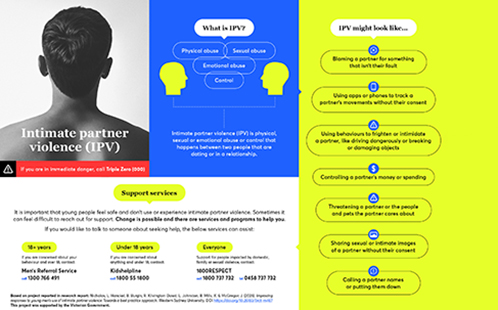Western Sydney University has launched a groundbreaking new study on the use of intimate partner violence (IPV) by young men aged 16-25. This is the first Australian study on this topic, and the first to speak to young men who use violence themselves.
The report, Improving responses to young men's use of intimate partner violence: Towards a best practice approach, reveals critical insights into how services can better respond to and support young men who use IPV.
Led by the Genders and Sexualities Research group, the project was completed in collaboration with the University's Young and Resilient Research Centre, Swinburne University, and partner organisations No to Violence, YSAS (Youth Support and Advocacy Service), and Drummond Street Services. It was supported by the Victorian Government.
The research team explored the lived experiences of 37 young people and spoke to 51 practitioners who come into contact with young men who use IPV across Victoria, focusing on marginalised young men, some of whom had used IPV, and young women who had experienced IPV in previous relationships.
The report noted that there were three key findings, firstly that there is a lack of specialised service responses for young men using IPV, leaving practitioners with few referral options.
Secondly the significant influence of patriarchal norms, social contexts, trauma, and family relationships on youth IPV and thirdly that the importance of trauma-informed, youth-specific responses that build trust, self-esteem, and accountability.

Lead author of the report Associate Professor Lucy Nicholas from the Genders and Sexualities Research group observed that IPV among young people is often overlooked in service design.
"Our research shows that young men need tailored, non-judgemental support that recognises their trauma and offers pathways to change," said Associate Professor Nicholas.
"This is not about excusing violence, it's about creating conditions that allow for accountability and transformation."
The study highlights that IPV use by young men often manifests as coercive control, emotional abuse, and monitoring behaviours, including through social media. It also identifies protective factors, including trusted adult relationships, cultural connection, and faith communities, as motivators for change.
Associate Professor Benjamin Hanckel, from the Institute for Culture and Society and the Young and Resilient Research Centre, notes that this research underscores the urgent need for youth-friendly services.
"Effective engagement means meeting these young people where they are, with empathy, cultural relevance, and a commitment to long-term support," said Associate Professor Hanckel.
The team have developed a suite of resources for practitioners, policy makers and young men which is available online at https://lucyknicholas.wordpress.com/adolescent-ipv-project/.
The full report, Improving responses to young men's use of intimate partner violence: Towards a best practice approach, is also available at https://doi.org/10.26183/0rct-m487.






